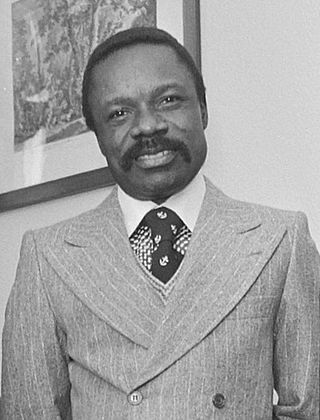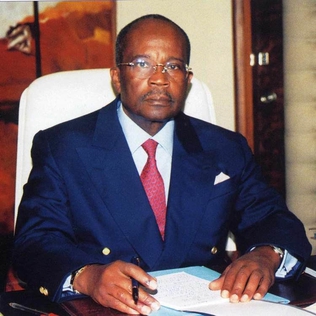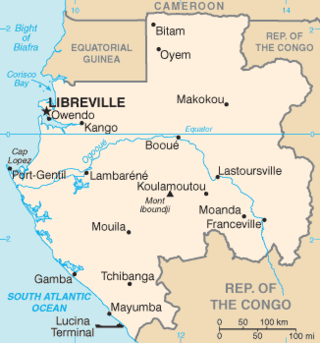| |||||
| Decades: | |||||
|---|---|---|---|---|---|
| See also: | |||||
The following lists events the happened during 2011 in Gabon .
| |||||
| Decades: | |||||
|---|---|---|---|---|---|
| See also: | |||||
The following lists events the happened during 2011 in Gabon .

Gabon, officially the Gabonese Republic, is a country on the Atlantic coast of Central Africa, on the equator, bordered by Equatorial Guinea to the northwest, Cameroon to the north, the Republic of the Congo on the east and south, and the Gulf of Guinea to the west. It has an area of 270,000 square kilometres (100,000 sq mi) and a population of 2.3 million people. There are coastal plains, mountains, and a savanna in the east. Libreville is the country's capital and largest city.
Little is known of the history of Gabon before European contact. Bantu migrants settled the area beginning in the 14th century. Portuguese explorers and traders arrived in the area in the late 15th century. The coast subsequently became a centre of the transatlantic slave trade with European slave traders arriving to the region in the 16th century. In 1839 and 1841, France established a protectorate over the coast. In 1849, captives released from a captured slave ship founded Libreville. In 1862–1887, France expanded its control including the interior of the state, and took full sovereignty. In 1910 Gabon became part of French Equatorial Africa and in 1960, Gabon became independent.

Omar Bongo Ondimba was a Gabonese politician who was the second president of Gabon for almost 42 years, from 1967 until his death in 2009. Bongo was promoted to key positions as a young official under Gabon's first President Léon M'ba in the 1960s, before being elected vice-president in his own right in 1966. In 1967, he succeeded M'ba to become the country's second president, upon the latter's death.
Paul Mba Abessole is a Gabonese politician who heads the National Woodcutters' Rally – Rally for Gabon and was a leading opponent of President Omar Bongo during the 1990s. He stood as a presidential candidate twice during the 1990s and also served as Mayor of Libreville, the capital. From 2002 to 2009 he served in the government of Gabon, holding the rank of Deputy Prime Minister for most of that period.
Paulin Obame-Nguema was a Gabonese politician who was the Prime Minister of Gabon from 2 November 1994 to 23 January 1999. He was a Deputy in the National Assembly of Gabon.

Ali Bongo Ondimba, also known as Ali Bongo and Ali Ben Bongo, is a Gabonese former politician who was the third president of Gabon from 2009 to 2023. He is a member of the Gabonese Democratic Party. He is the son of Omar Bongo, who was president of Gabon from 1967 until his death in 2009. During his father's presidency, he was Minister of Foreign Affairs from 1989 to 1991, represented Bongoville as a deputy in the National Assembly from 1991 to 1999, and was the Minister of Defense from 1999 to 2009. After his father's death, he won the 2009 Gabonese presidential election. He was reelected in 2016, in elections marred by numerous irregularities, arrests, human rights violations, and post-election protests and violence.
Zacharie Myboto is a Gabonese politician and President of the National Union (UN), an opposition party. He was the Administrative Secretary of the Gabonese Democratic Party (PDG) from 1972 to 1990 and served in the government from 1978 to 2001. After resigning from the government, he became an opposition leader, founding the Gabonese Union for Democracy and Development (UGDD) in 2005 and placing third in the 2005 presidential election. He became President of the Group of the Forces of Change in the National Assembly in 2007.

Jean Eyeghé Ndong is a Gabonese politician. He was the Prime Minister of Gabon from January 20, 2006 to July 17, 2009. He was also the First Vice-president of the Gabonese Democratic Party (PDG) until 2009.

Casimir Marie Ange Oyé-Mba was a Gabonese politician. After serving as Governor of the Bank of Central African States (BEAC) from 1978 to 1990, Oyé-Mba was Prime Minister of Gabon from 3 May 1990 to 2 November 1994. Subsequently, he remained in the government as Minister of State for Foreign Affairs from 1994 to 1999, Minister of State for Planning from 1999 to 2007, and Minister of State for Mines and Oil from 2007 to 2009.

Presidential elections were held in Gabon on 6 December 1998. Incumbent President Omar Bongo, in power since 1967, sought a seven-year term against five other candidates. It was Gabon's second multi-party presidential election and, despite low turnout and polling problems, Bongo won the election with 66.88% of the vote.

The 1964 Gabonese coup d'état was staged between 17 and 18 February 1964 by Gabonese military officers who rose against Gabonese President Léon M'ba. Before the coup, Gabon was seen as one of the most politically stable countries in Africa. The coup resulted from M'ba's dissolution of the Gabonese legislature on 21 January 1964, and during a takeover with few casualties 150 coup plotters arrested M'ba and a number of his government officials. Through Radio Libreville, they asked the people of Gabon to remain calm and assured them that the country's pro-France foreign policy would remain unchanged. A provisional government was formed, and the coup's leaders installed Deputy Jean-Hilaire Aubame, who was M'ba's primary political opponent and had been uninvolved in the coup, as president. Meanwhile, M'ba was sent to Lambaréné, 250 kilometres (155 mi) from Libreville. There was no major uprising or reaction by the Gabonese people when they received word of the coup, which the military interpreted as a sign of approval.

Parliamentary elections were held in Gabon on 12 April 1964. The elections were originally scheduled to be held during the week of an abortive coup, but President Leon M'ba of the Gabonese Democratic Bloc (BDG) dissolved the National Assembly and rescheduled them for 12 April. Despite widespread lack of free speech and intimidation of voters, the opposition still garnered 45% of the vote.
André Mba Obame was a Gabonese politician. After serving as an adviser to President Omar Bongo in the 1980s, he was a minister in the government of Gabon from 1990 to 1991 and again from 1997 to 2009; during that time, he was identified with the reformist wing of the ruling Gabonese Democratic Party (PDG). He held the key post of Minister of the Interior from 2006 to 2009 and then briefly served as Minister of the Coordination and Follow-up of Government Action in mid-2009. He was an independent candidate in the 30 August 2009 presidential election and placed third with 25.33% of the vote, according to official results, but he claimed victory and alleged that the PDG candidate, Ali Bongo, won through fraud.
Pierre-André Kombila Koumba is a Gabonese politician, professor, and medical doctor. He was the First Secretary of the National Rally of Woodcutters (RNB), Gabon's main opposition party, from 1990 to 1998; he then led a split from the RNB, establishing the more radical National Rally of Woodcutters - Democrats (RNB-D) in 1998. He was nominated as the RNB-D's candidate for the 1998 presidential election, but received only a small share of the vote. Later, he abandoned his opposition to President Omar Bongo and joined the government, serving as Minister of Technical and Vocational Education from 2006 to 2009 and as Minister of Hydraulic Resources and New Energies in 2009. Following Bongo's death, he rejoined the opposition in mid-2009.
Jules-Aristide Bourdes-Ogouliguende was a Gabonese politician who was the President of the Congress for Democracy and Justice (CDJ), an opposition party. He served as a minister in the government of Gabon from 1976 to 1990 and was President of the National Assembly from 1990 to 1993; from 1993 until his death in 2018.

Early presidential elections were held in Gabon on 30 August 2009. They took place due to the death of incumbent President Omar Bongo on 8 June, after more than 41 years as the sole president of Gabon. While the constitution stated that interim President Rose Francine Rogombé should organise elections within 30 to 45 days, the Constitutional Court accepted the government's request for a delay due to the circumstances.
Paul Biyoghé Mba is a Gabonese politician who was Prime Minister of Gabon from July 2009 to February 2012. A member of the Gabonese Democratic Party (PDG), he served for years as a minister in the government prior to his appointment as Prime Minister. From 2012 to 2015, he was President of the Economic and Social Council of Gabon, and he has again served in the government as First Deputy Prime Minister for Health since 2015.

Raymond Ndong Sima is a Gabonese politician who has been the Prime Minister of Gabon since September 2023. He was previously prime minister from February 2012 to January 2014.

Presidential elections were held in Gabon on 27 August 2016. Incumbent President Ali Bongo Ondimba ran for re-election and was challenged by former Minister of Foreign Affairs Jean Ping. On 31 August, the electoral commission proclaimed Bongo's re-election with a margin of less than two percent. Large protests broke out in the capital Libreville after the results were announced. Irregularities such as Haut-Ogoou showing that 99.9% of the electorate had voted and Bongo had received 95.5% of the votes led to observers questioning the conduct of the election.
The African nation of Gabon has had human inhabitants for perhaps 400,000 years. Bantu peoples settled here from the 11th century. The coastline first became known to Europeans through Portuguese and Dutch sailors. Colonised by the French in the 19th century, Gabon became independent in 1960.